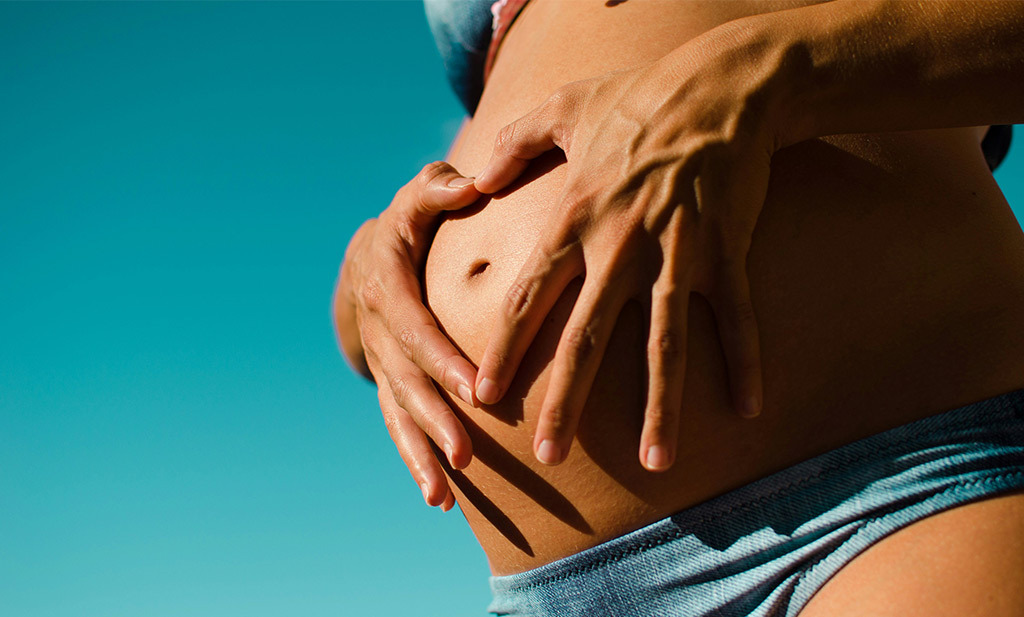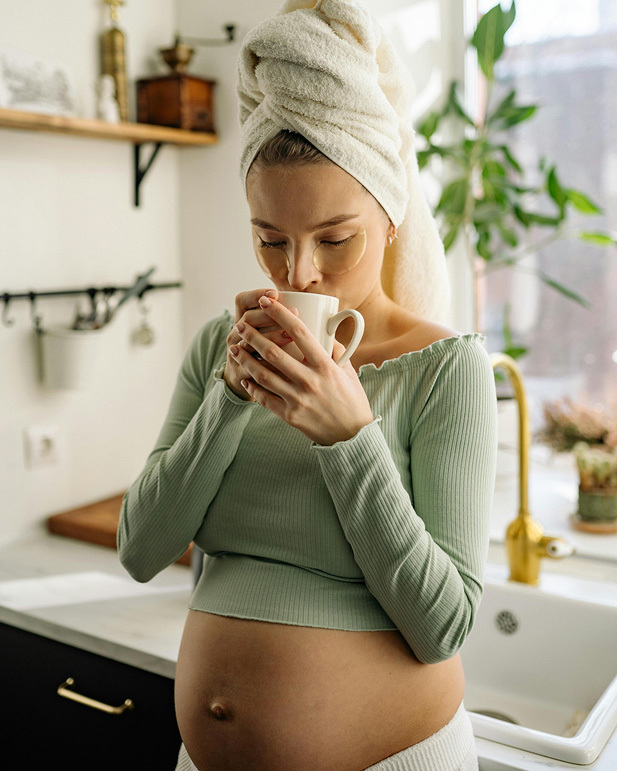
Yay and congratulations, you’re pregnant! We hope you’re doing well and enjoying this exciting new stage of your life without worrying too much about what you should or shouldn’t be doing. There are so many myths about being pregnant but don’t let them stress you out. There are a few rules to follow simply to protect yourself and the little miracle in your tummy. For example, the topic ‘What not to eat and drink during pregnancy’, is a topic we’ve discussed on the blog before. Today, together with our expert Katrin, we want to take a closer look at a few more persistent rumours, like, can you dye your hair when pregnant? ect..Which ones are true and which ones can we bust?
Can you dye your hair when pregnant?
For most of you, one thing is certain: don’t dye your hair using traditional hair dyes during pregnancy. Especially in the first three months of pregnancy. This is because your child’s arms and legs are developing during this time and the nerve cells in the brain are connecting. A very sensitive phase in development. You want to play it safe, don’t you? The same also applies to bleaching and perms. To be on the safe side, you should really avoid all of these during pregnancy and while breastfeeding.
But why is that? Do the substances actually get into your bloodstream and thus into and onto your child and breast milk? Yes and no. Oxidising agents contain PPD (p-phenylenediamine). The limit value for this chemical in hair dyes in the UK is 2 per cent and must not be exceeded which is considered a safe amount. However, if you dye your hair with it permanently, it cannot be ruled out that small amounts of harmful substances will enter your bloodstream via your scalp. Researchers at the University of Heidelberg have even been able to detect traces in breast milk and the fatty tissue of babies. However, this is not yet proof of an actual risk. And there is also no evidence of a risk with perms, as the hair is treated with hydrogen peroxide through oxidation, but this is quickly broken down into hydrogen and oxygen and is therefore harmless. Nevertheless, it is better to be safe than sorry.
If this is unthinkable for you, there are alternatives: Because the chemicals in highlights do not reach the scalp, for example, they are unproblematic. Wash-out colours (tints) are also harmless because they do not penetrate the hair and the colour particles are so large that they are not easily absorbed by the scalp. Colouring shampoos with walnut, chestnut or camomile are also a great alternative. Just make sure that the products don’t come from another country where they might have different regulations. If you are interested in henna, you should make sure that it is made from purely plant-based raw materials.

Photo by Yan Krukau on Pexels
Is flying safe when pregnant?
You want a grown-up holiday for the last time for a while, and to take some time to relax in the sun before baby throws everyday life into disarray? That’s understandable. And recommended! But the UK isn’t known for its tropical weather so what about getting on a plane? Is flying safe when pregnant? Unless your doctor and/or midwife forbid it, there’s no reason not to. After all, flying does not harm either mother or child. However, every pregnancy is different, so you should make sure you are safe beforehand. And airlines are also different. Many impose a general ban on flying from week 36 of pregnancy, some even earlier (especially for twins etc.). Or for some you need to present a medical certificate confirming that you are fit to fly. Check with your airline before you book! Then for your own sake, you should prioritise shorter flights (up to four hours), make sure you drink plenty of fluids during the flight, stand up regularly and wear loose-fitting clothing. Then nothing will stand in the way of flying during pregnancy. Babymoon here you come!
Is sex safe during pregnancy?
Absolutely! Especially in the many cases where a pregnancy is progressing normally. Because when it comes to sex during pregnancy, the rule is: whatever pleases you and doesn’t hurt is allowed. Your baby is well protected by the uterus and the amniotic fluid and will not be harmed by penetration. However, you may notice that something has changed for you. You are carrying a child, and this means an enormous physical and emotional adjustment. It may well be that your need for closeness and sexuality has changed. Don’t let this unsettle you but talk about it openly with your partner if you have one.
Nevertheless, there are a few cases in which you should refrain from penetrating the vagina. For example, if you have an increased risk of infection, bleeding, premature labour, an unfavourably positioned placenta or premature rupture of the membranes. You should also be careful in the first trimester of your pregnancy if you have already had an early miscarriage, and in the last trimester of your pregnancy if you suspect a premature birth or are expecting multiples. In these cases, however, your doctor or midwife should have already advised you of this. Of course, you should also contact them if you experience any symptoms. Otherwise: enjoy!
Does every pregnant woman have weird pregnancy cravings?
Sour gherkins with whipped cream, lots of chocolate, fried food… you must have heard of some weird pregnancy cravings? Yes, they really do exist. However, not everyone experiences them. And it’s not uncommon for you to suddenly feel a craving for healthy treats such as fruit, salad or vegetables, rather than some crazy combination of foods. But why is that?
There is no clear answer (yet). So far, there are only speculations. Hormones could be to blame, for example. But also a lack of nutrients. Chocolate, for example, provides vitamin B and also satisfies an increased need for magnesium. Gherkins supply your body with sodium. However, hormones once again share some of the blame pregnancy cravings. This is because the pregnancy hormone beta-hCG rises sharply at the beginning of pregnancy, which often leads to discomfort. But also to cravings. This continues until around the 10th week of pregnancy. After that, the beta-hCG level drops rapidly and the cravings often disappear again. If you suffer from cravings later in the pregnancy, this is more likely to be due to fluctuating blood sugar levels.
Does morning sickness only occur in the morning?
Wrong. And wrong again. One of the worst named pregnancy symptoms is morning sickness. As although it is colloquially known as morning sickness, very few pregnant women experience nausea exclusively in the morning. Although it often occurs at this time, it is not uncommon for it to continue throughout the day. Sometimes as a queasy feeling in the stomach, sometimes in the form of vomiting. Around 70 to 80 per cent of all pregnant women experience this, especially in the first twelve to 14 weeks of pregnancy – half of them vomit regularly.
Generally some sickness is actually a good sign, as it indicates a high level of pregnancy hormones (beta-hCG and oestrogen). Whether these are the sole cause of the nausea has not been scientifically proven, but they probably play a decisive role, as hormone levels are usually particularly high between the fifth and 12th week of pregnancy. Other reasons for the discomfort are low blood sugar levels, stress, stomach sensitivity, deficiency symptoms and a poor diet.
As everybody is different and reacts differently to the physical and hormonal changes, it is also completely normal if you do not experience any nausea. If you feel nauseous after the first twelve weeks or if your symptoms are particularly bad, please talk to your GP or midwife about it.
Can you predict the sex of baby?
Feeling sick in the morning? It’s going to be a girl! Is your belly growing pointed forwards? Congratulations, it’s a boy! You have a craving for savoury food? Voilà, a boy! Your hair is greasier during pregnancy and your skin is worse than usual? There’s a girl on the way! You’ve probably heard of these or similar typical signs for girls or typical signs for boys. And from a scientific point of view, there are also some theories (heartbeat, position of the placenta on the first ultrasound, skull shape, etc) that can supposedly predict the baby’s sex much earlier than the 20th week of pregnancy. But… nothing has been proven here and some things are simply a stroke of luck.
The sex of your baby can be determined by blood test in your first trimester but this isn’t routinely offered in the UK so you’d need to go private. Otherwise, the so called “anatomy scan” around the 20th week of pregnancy is and remains the date on which your doctor can tell you with a high degree of probability what it will be. If your little one plays along.

Photo by Richard Jaimes on Unsplash
Although the sex is determined at conception, all embryos look the same at the beginning: with a bud between the legs. If you are having a boy, your body starts to produce testosterone around the eighth week of pregnancy, which causes the small bulge to grow and form a penis and scrotum. In girls, the clitoris and labia develop from this point onwards. A subtle difference can only be seen from week 11: In boys at this stage, something protrudes upwards at an angle of more than 30 degrees to the spine, whereas in girls it is more horizontally orientated. The difference is so subtle that there is still a great risk of confusion. So, if you want to find out baby’s sex, be patient and wait until your second ultrasound appointment. And until then, just pass the time with fun guesswork.
Should a pregnant woman go in a hot tub?
Do something good for yourself, relax, enjoy the peace and quiet before things get turbulent… a spa weekend with a hot tub, regular trips to the swimming pool or candlelit baths in your own bathtub sound wonderful, don’t they? Yes and no. A relaxing bath in the bathtub (at the recommended 33 to 34 degrees) and regular swimming are ideal and absolutely beneficial for most pregnant women. You feel weightless in the water, your joints are spared, your back is noticeably relieved and water retention, thrombosis and tiredness are prevented. The risk of infection in public swimming pools is also classed as low, as the water is well monitored and thoroughly cleaned on a regular basis. Although chlorinated water dries out the skin, it is safe for pregnant women.
So if your pregnancy is completely normal, you can enjoy a bath and a swim. Exceptions to this are pregnant women who have or experience bleeding, premature labour, a high-risk pregnancy, nausea or dizziness, for example. In this case, you should change the focus of your wellness programme. If the experts give you the green light, go for it!
But, should a pregnant woman go in a hot tub? These aren’t recommended for you if you are pregnant. This is because hot tubs are home to many bacteria and fungi, which can multiply wonderfully in warm water. As the local immune defence of your vaginal flora is weakened by the pregnancy hormones, such a trip to the hot tub can give you painful fungal infections. You should avoid infections like this at all costs, especially in the first trimester.
Can you dye your hair when pregnant? What’s true and untrue?
That’s the thing about rumours and myths. Sometimes there’s no truth to them but sometimes there’s no smoke without fire and a hint of truth remains. Like the answer to can you dye your hair when pregnant – yes and no! And that’s exactly what can be unsettling, not knowing whether to believe it or not. We hope we have been able to dispel any uncertainty on the myths above with this article. The important thing is don’t go wild and don’t stress yourself out. You don’t have to listen to anyone else, just take good care of yourself, listen to your gut feeling and of course to your doctor and midwife.
Need more pregnancy tips? visit our blog here
—————————————–
featured Photo by Ignacio Campo on Unsplash



